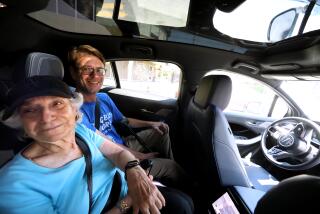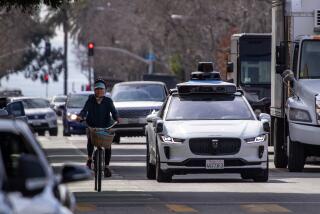Honda Says ATV Riders to Blame for Accidents
- Share via
SAN DIEGO — A rise in the number of injuries and deaths associated with a controversial three-wheel off-road motorcycle has been blamed by Honda experts on riders and not on the machine, a high-ranking corporate executive of the Japanese manufacturing firm said here Tuesday.
Testifying in a San Diego Superior Court case involving a boy seriously injured in 1982 while riding one of Honda’s all-terrain vehicles--also known as ATVs--Tetsuo Chino defended both the company’s products and its record of responding to deficiencies when they are brought to the attention of corporate officials.
The courtroom appearance of Chino, who is senior managing director of Honda Motor Co. Ltd. of Japan as well as chairman of the board and former president of Gardena-based American Honda Motor Co. Inc., has attracted attention from personal injury attorneys throughout the United States. Chino oversees Honda’s North American operations.
Alarmed by Claims
He testified that he was not aware of the increase in the number of ATV-related injuries and deaths until 1984. Once he learned that legal claims filed by injured riders were also on the rise, Chino said, he became “concerned” and directed his staff to look into the complaints.
A subsequent investigation into the alleged instability of the three-wheeled vehicles, Chino said, produced a report from Honda’s research staff that concluded: “There is no problem with the machine. The problem is with the rider.”
The U.S. Justice Department is investigating the ATV safety issue in connection with a proposed recall of the machines. ATVs require no license or training to operate and may be driven by riders of any age.
Lawyers in Attendance
On Tuesday, lawyers from numerous law firms packed the courtroom for Chino’s testimony, taking copious notes as the diminutive, bespectacled man in a dark gray suit answered questions, frequently with the help of a Japanese translator.
Steven Archer, a Los Angeles attorney who has handled about six such cases and is closely watching the San Diego proceedings, said Chino’s appearance is key because it is “the first time these questions about defects and so forth have been asked that far up the corporate ladder.”
In previous cases, engineers or members of Honda’s research and development division have typically answered for the company, according to Archer and other attorneys affiliated with the ATV Litigation Group, an informal association of lawyers nationwide who handle cases involving the vehicles.
According to court records, Honda bitterly fought efforts to obtain Chino’s testimony in the San Diego case. The company ultimately took the matter all the way to the state Supreme Court, but lost the fight there earlier this year.
Controversy has dogged ATVs since their debut on the market in 1970 and has reached an all-time peak in recent years. Priced between $600 and $2,000, the vehicles--also manufactured by Suzuki and Yamaha--have become extremely popular, with more than 2.5 million sold in the United States alone.
Critics complain, however, that the vehicles are all but unregulated and are difficult for children to operate safely.
According to the U.S. Consumer Product Safety Commission, ATVs have been linked to an average of 20 deaths and 7,000 injuries a month nationwide in the last two years. As of June, 1987, the total death count associated with the vehicles was 789. About half the victims injured or killed were under 16.
The American Academy of Pediatrics has lobbied for banning their manufacture. A total of 500 lawsuits have been filed concerning injuries or deaths resulting from the ATVs’ use.
Alerted to the alleged safety problems, the consumer commission in December proposed a voluntary recall of all three-wheel ATVs for children and adults and of all three- and four-wheel ATVs sold for use by children under 16. In addition, the commission may force manufacturers to apprise past and present consumers of the danger of the machines and require training for all purchasers.
Refund Considered
Under the proposed recall, which would be one of the largest in history, manufacturers would be required to refund the cost of the machines voluntarily returned by consumers. The proposal has been vigorously opposed by industry and ATV enthusiasts.
The episode at issue in the San Diego case involves Frank Cusimano Jr. Cusimano was 9 years old in August, 1982, when he was thrown from the back of a Honda ATC 110 driven by his friend, 8-year-old Jason Kardos, on a vacant lot in Spring Valley.
According to the lawsuit, Cusimano’s foot came off the vehicle’s foot peg and was trapped between the peg and the rear wheel, causing him to be thrown from the vehicle. He suffered serious head injuries that caused brain damage and paralysis on the right side, his attorneys said.
In court Tuesday with his parents and sister, Cusimano, now 15, walked with a noticeable limp, and his right arm appeared disabled. Edward Allard, one of his two attorneys, said he has a vocabulary of about 40 words.






